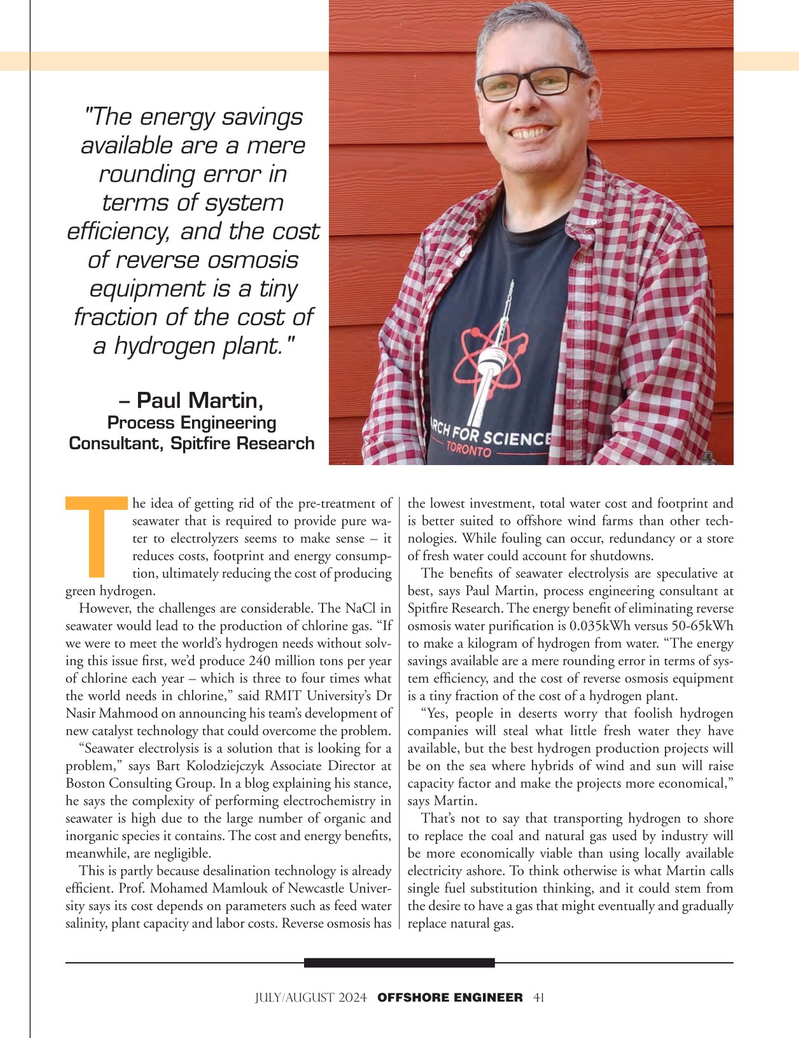
Page 41: of Offshore Engineer Magazine (Jul/Aug 2024)
Read this page in Pdf, Flash or Html5 edition of Jul/Aug 2024 Offshore Engineer Magazine
"The energy savings available are a mere rounding error in terms of system efficiency, and the cost of reverse osmosis equipment is a tiny fraction of the cost of a hydrogen plant." – Paul Martin,
Process Engineering
Consultant, Spitfire Research he idea of getting rid of the pre-treatment of the lowest investment, total water cost and footprint and seawater that is required to provide pure wa- is better suited to offshore wind farms than other tech- ter to electrolyzers seems to make sense – it nologies. While fouling can occur, redundancy or a store reduces costs, footprint and energy consump- of fresh water could account for shutdowns.
tion, ultimately reducing the cost of producing The benefts of seawater electrolysis are speculative at
T green hydrogen. best, says Paul Martin, process engineering consultant at
However, the challenges are considerable. The NaCl in Spitfre Research. The energy beneft of eliminating reverse seawater would lead to the production of chlorine gas. “If osmosis water purifcation is 0.035kWh versus 50-65kWh we were to meet the world’s hydrogen needs without solv- to make a kilogram of hydrogen from water. “The energy ing this issue frst, we’d produce 240 million tons per year savings available are a mere rounding error in terms of sys- of chlorine each year – which is three to four times what tem effciency, and the cost of reverse osmosis equipment the world needs in chlorine,” said RMIT University’s Dr is a tiny fraction of the cost of a hydrogen plant.
Nasir Mahmood on announcing his team’s development of “Yes, people in deserts worry that foolish hydrogen new catalyst technology that could overcome the problem. companies will steal what little fresh water they have “Seawater electrolysis is a solution that is looking for a available, but the best hydrogen production projects will problem,” says Bart Kolodziejczyk Associate Director at be on the sea where hybrids of wind and sun will raise
Boston Consulting Group. In a blog explaining his stance, capacity factor and make the projects more economical,” he says the complexity of performing electrochemistry in says Martin.
seawater is high due to the large number of organic and That’s not to say that transporting hydrogen to shore inorganic species it contains. The cost and energy benefts, to replace the coal and natural gas used by industry will meanwhile, are negligible. be more economically viable than using locally available
This is partly because desalination technology is already electricity ashore. To think otherwise is what Martin calls effcient. Prof. Mohamed Mamlouk of Newcastle Univer- single fuel substitution thinking, and it could stem from sity says its cost depends on parameters such as feed water the desire to have a gas that might eventually and gradually salinity, plant capacity and labor costs. Reverse osmosis has replace natural gas.
JULY/AUGUST 2024 OFFSHORE ENGINEER 41

 40
40

 42
42